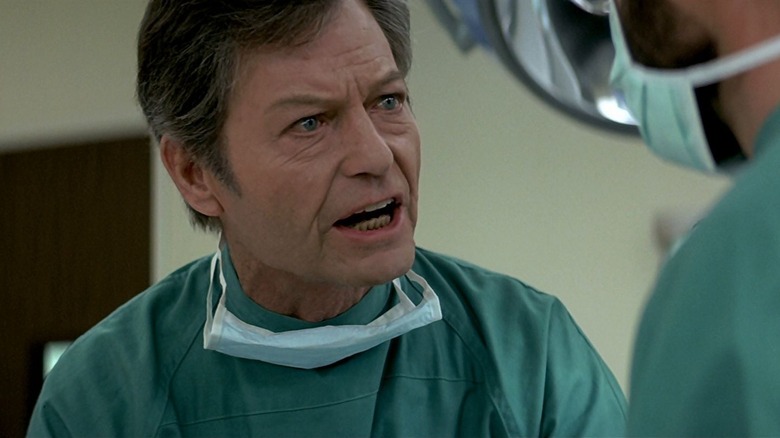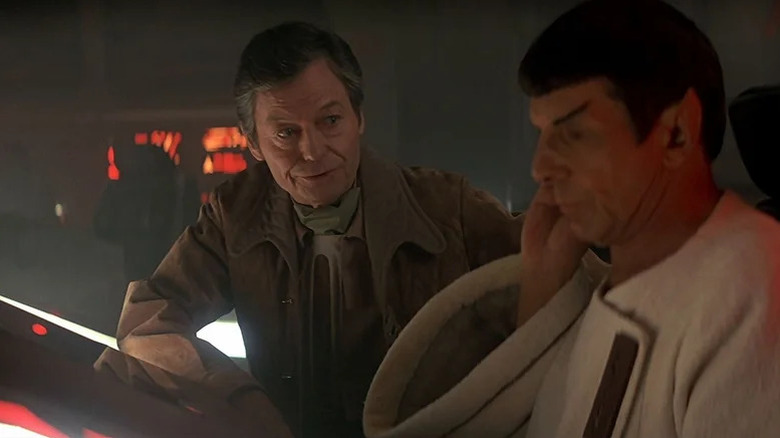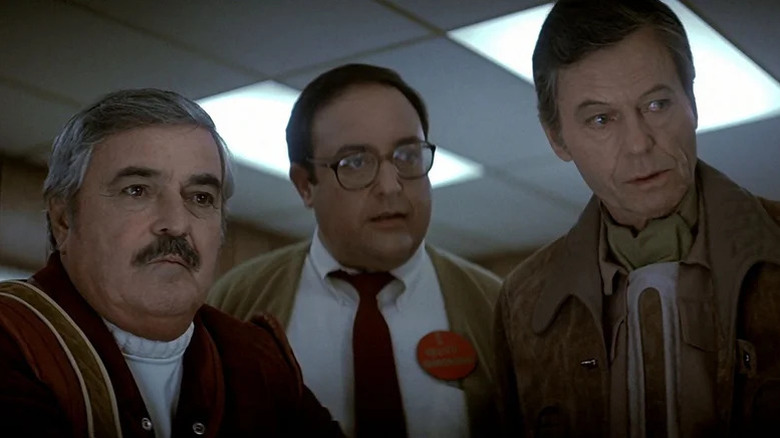DeForest Kelley Made A Change To Star Trek's Dr. McCoy In The Voyage Home
We may receive a commission on purchases made from links.
At the beginning of Leonard Nimoy's 1986 hit film "Star Trek IV: The Voyage Home," the U.S.S. Enterprise has been destroyed. The Enterprise's senior staff were able to survive by stealing a Klingon vessel and taking it to Vulcan, where they have been hiding out for a spell. They know that when they return to Earth, they are going to be severely reprimanded, and likely drummed out of Starfleet. They nicknamed their Klingon vessel the Bounty, after the 1932 novel by Charles Nordhoff and James Norman Hall.
Also, a few of the main characters have undergone significant changes. Most notably, Spock (Nimoy) has to become re-accustomed with being alive, having spent the bulk of "Star Trek III: The Search for Spock" partially embedded inside the brain of Dr. McCoy (DeForest Kelley). Spock died at the end of "Star Trek II: The Wrath of Khan," but he secretly enacted a mind-meld with McCoy just before perishing, essentially imprinting a copy of his consciousness within McCoy's. McCoy, thanks to spending the whole of "Star Trek III" with Spock's soul trapped in his body, also seems to have undergone some subtle changes himself. Notably, he and Spock seem to have a lot more in common now. This was a change from the spiky, often combative working relationship the two characters traditionally shared.
Back in 2014, StarTrek.com unearthed a 1986 audio interview with DeForest Kelley, who had been playing Dr. McCoy on and off for essentially two decades at that point. In the interview, the actor commented on the progress Dr. McCoy had made since the early days, and how large character developments had to be made from film to film, as opposed to the incremental character development he worked on during a weekly TV series.
Notably, he said, Dr. McCoy had to mellow out a lot in the movies.
Dr. McCoy got along a lot better with Spock in The Voyage Home
In that interview, Kelley talked about the timeline of the then-four feature films vs. the timeline of the 79 episodes of the original series, and how character arcs must be condensed for the latter. On a weekly show, he noted, a character isn't necessarily going to change over two episodes, but with a year or more between movies, new changes must be considered immediately. Most notably, McCoy had to develop a new relationship with Spock, and right away. On the series, McCoy was openly annoyed by Spock's cold logic. After working with Spock for 20 years, though, that relationship had to evolve. Kelley said:
"It's very difficult to expand or flesh a character out in a motion picture, so to speak. When we're doing them, it takes a couple of years to get one out. If we were still doing the series, why, it would be a lot of fun to see how these characters change during the aging process. So what I tried to do in ['The Voyage Home'] is kind of ... not soften McCoy, but he's become a little more attuned to Spock and he's looking at him more or less with a bit of amusement, as opposed to becoming so irritated with him."
This makes sense. After working with Spock for two decades — and carrying his soul around for a while — McCoy couldn't possibly hang on to petty workplace animosity. In that time, McCoy also committed a brazen act of mutiny, helping Kirk (William Shatner) and his other crewmates hijack the U.S.S. Enterprise for entirely selfish ends. The hijacking would eventually lead to the destruction of the Enterprise, but after so much sacrifice, McCoy would necessarily have to be warmer and more peaceful about working with Spock.
Did Leonard Nimoy and DeForest Kelley get along in real life?
Kelley also noted that a TV schedule allowed for more creative opportunities, specifically the opportunity to get things wrong every once in a while. When one is making 20-odd episodes a season and shooting on a tight, weekly schedule, there are bound to be stories that are a little rushed, and perhaps half-baked. Audiences would be forgiving, however, as there would be a new episode seven days later to "reset" any ill feelings. Kelley knew that a movie had to get everything right the first time, as they were released as major, infrequent events.
The swift evolution of McCoy paralleled the relationship Kelley had with Nimoy in real life. He had certainly started to feel a great deal of warmth about Nimoy, and by 1986, Kelley saw his co-star and director as a lifelong companion, someone he had lived his life with. As he put it:
"I've had a great deal of fun working with Leonard, and we enjoy our relationship very much. It's kind of fun to look back over the years at some of the old episodes and see ourselves rather grow old together."
Kelley went on to admit in the 1986 interview that he was a lazy actor, and that he would have been content with the "Star Trek" gig, even if it didn't lead to a prolonged film franchise. He, like several other Trek actors, didn't think the show would last very long and that a sci-fi series might even eat into some co-stars' professional credibility. "[W]hen I saw Leonard with his makeup with the ears," Kelley said. "I thought 'Well, he's had it.'"
Thankfully, none of their careers were killed by "Star Trek," and the success of the franchise gave everyone a chance to return to the franchise again and again.


